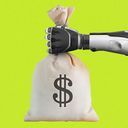Why AI could boost the economy faster than past technologies

Generative artificial intelligence could create more rapid change in the workplace and the economy than previous waves of tech advances.
Why it matters: If that assessment, made by a top Federal Reserve official and other thinkers at a high-profile conference Friday, proves correct, it would mean higher growth, rising incomes, less inflation — even as there's churn in the labor market as some tasks become automated.
What they're saying: "There's no technology I'm aware of that ever reduced employment on net," Mary Daly, president of the San Francisco Fed, said at the University of Chicago Booth Monetary Policy Forum.
- "But it significantly disrupts the allocation of that employment and who wins and who loses from the new technologies."
State of play: Daly argued that the typical process by which new technologies are incorporated into business operations — and generate productivity gains — is first by replacing mundane tasks done by humans, then augmenting the work of humans, then leading to new types of jobs entirely.
- Rather than happening sequentially, she said, there is reason to think AI is causing all three of those things to happen simultaneously.
- That implies that the "S" curve of technology adoption — with minimal gains at first, followed by sharp productivity gains that then level off — could be shorter and steeper with AI than it was with past advances.
For example, Daly told of a company in her Fed district that does design and production of more than 100,000 items, ranging from tiny screws to products that cost thousands of dollars.
- The firm employs copywriters who have a long backlog of unwritten product descriptions for less popular items. An AI-driven program has now taken over the task.
- Because copywriters don't have to worry about a backlog of product descriptions for screws, they can do higher-value work collaborating with sales, meaning more growth for the firm as a whole, Daly said.
The other side: Not everyone in high-level economic policy circles is convinced. It could be that while AI is the latest technology to improve productivity, it won't actually increase the pace of productivity gains, as New York Fed president John Williams argued recently.
Between the lines: It's telling that this topic was discussed at length in a monetary policy forum — one attended by nine out of 19 members of the Fed's policy committee.
- It shows how questions around AI's productivity and labor market implications are becoming increasingly front-of-mind for policymakers.
- "Why am I here?" pondered Andrew McAfee, an MIT research scientist who also appeared on the panel.
- Because, he said, general-purpose technologies like AI fit in the "Venn Diagram of things that macroeconomists and people who think about monetary policy are interested in, and people who study the economic consequences of very powerful technologies."